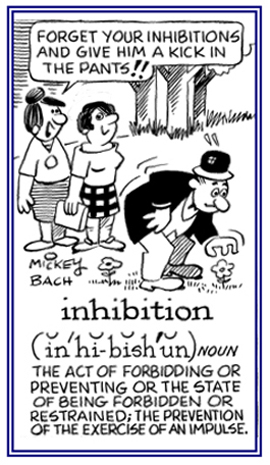You searched for:
“inhibitions”
1. A feeling of being embarrassed or a belief that prevents a person from behaving spontaneously or speaking freely: Marie is a very outgoing person and so she doesn’t have any inhibitions of talking to people she meets for the first time.
2. A mental state in which a person's activity or behavior is stifled or obstructed: Shy people are often said to suffer from inhibitions.
3. The slowing down or prevention of a chemical reaction: Certain substance inhibitions are widely used to retard various undesirable processes; for example, the corrosion of metals.
4. The suppression or blocking of a bodily process or the action of an body organ: The doctor caused the inhibition of Jim's heart beat with an electrical stimulation of the vagus nerve.
5. Etymology: from Latin inhibitus; from inhibere, "to hold in, to hold back, to restrain"; from in-, "in, on" harbere, "to have, to hold".

© ALL rights are reserved.
Go to this Word A Day Revisited Index
2. A mental state in which a person's activity or behavior is stifled or obstructed: Shy people are often said to suffer from inhibitions.
3. The slowing down or prevention of a chemical reaction: Certain substance inhibitions are widely used to retard various undesirable processes; for example, the corrosion of metals.
4. The suppression or blocking of a bodily process or the action of an body organ: The doctor caused the inhibition of Jim's heart beat with an electrical stimulation of the vagus nerve.
5. Etymology: from Latin inhibitus; from inhibere, "to hold in, to hold back, to restrain"; from in-, "in, on" harbere, "to have, to hold".

Go to this Word A Day Revisited Index
so you can see more of Mickey Bach's cartoons.
This entry is located in the following units:
habit-, hab-, -hibit; habili-, habil-
(page 4)
-tion
(page 14)
Word Entries containing the term:
“inhibitions”
1. A condition in which the action of one group of a pair of antagonistic muscles is inhibited by the excitation of the other group: An example of reciprocal inhibition is when the biceps are prevented from contracting and bending the arm at the elbow, while the triceps are extending the arm, which is a result of reciprocal innervation.
2. The inhibition of an anxiety-provoking response by the practice of deep muscle relaxation: Reciprocal inhibition relates to behavior therapy in which the patient is exposed to anxiety-producing stimuli while in a controlled state of relaxation so that the anxiety response is gradually inhibited.
2. The inhibition of an anxiety-provoking response by the practice of deep muscle relaxation: Reciprocal inhibition relates to behavior therapy in which the patient is exposed to anxiety-producing stimuli while in a controlled state of relaxation so that the anxiety response is gradually inhibited.
This entry is located in the following units:
habit-, hab-, -hibit; habili-, habil-
(page 5)
reciproc-
(page 1)
reciprocal inhibition and desensitization (s) (noun), reciprocal inhibitions and desensitizations (pl)
In psychiatry, a form of behavior therapy in which the patient, while made to relax in comfortable surroundings, is gradually exposed to increasing amounts of anxiety-provoking stimuli: During reciprocal inhibition and desensitization, the patient can learn to tolerate these stimuli and may eventually learn to dissociate the anxiety from them.
This entry is located in the following units:
habit-, hab-, -hibit; habili-, habil-
(page 5)
reciproc-
(page 1)
